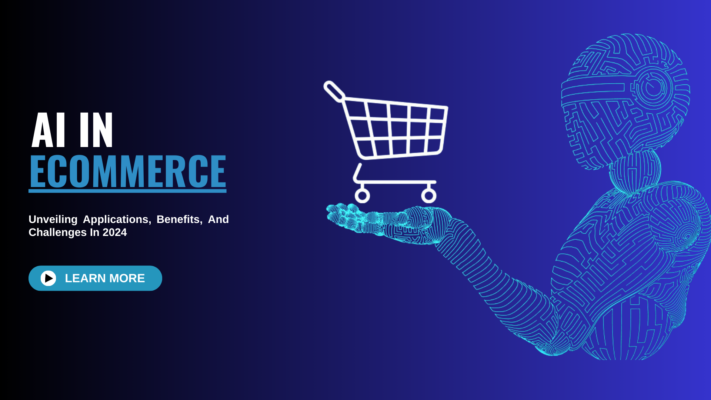
- April 15 2024
- admin
As we stride into 2024, the ecommerce landscape is undergoing a seismic shift, driven by the rapid integration of artificial intelligence (AI) technologies. From personalized shopping experiences to streamlined logistics, AI in ecommerce is poised to redefine the way we buy and sell online. This comprehensive blog delves into the applications, benefits, and challenges of AI in ecommerce, shedding light on the transformative potential that lies ahead.
Introduction
In the ever-evolving digital age, ecommerce has become an indispensable part of our daily lives. With the proliferation of smartphones and the convenience of online shopping, consumers have grown accustomed to seamless and personalized experiences. However, meeting these expectations at scale has proven challenging for businesses. Enter AI in ecommerce – a game-changer that promises to revolutionize the industry from the ground up.
II. AI in Ecommerce: A Paradigm Shift
The integration of AI in ecommerce is not just a passing trend; it’s a transformative force that is reshaping the entire industry. From product recommendations to supply chain optimization, AI is disrupting traditional business models and creating new opportunities for growth and innovation.
A. Personalized Shopping Experiences
One of the most significant applications of AI in ecommerce is personalization. By leveraging machine learning algorithms, AI can analyze customer data, browsing patterns, and purchase histories to deliver highly personalized product recommendations, tailored content, and targeted marketing campaigns. This level of personalization not only enhances the customer experience but also increases sales and customer loyalty.
B. Intelligent Search and Navigation
AI-powered search and navigation tools are revolutionizing the way customers discover products on ecommerce platforms. With natural language processing (NLP) and semantic search capabilities, AI can understand user intent and provide relevant and accurate search results, making it easier for customers to find what they’re looking for.
C. Predictive Analytics and Demand Forecasting
AI in ecommerce is also empowering businesses with predictive analytics and demand forecasting capabilities. By analyzing vast amounts of data, including sales patterns, market trends, and customer behavior, AI can accurately forecast demand and optimize inventory management, reducing waste and ensuring product availability.
III. Benefits of AI in Ecommerce
The benefits of integrating AI in ecommerce are numerous and far-reaching, impacting both businesses and consumers alike.
A. Enhanced Customer Experience
AI in ecommerce is transforming the customer experience by providing personalized recommendations, intelligent search capabilities, and seamless navigation. This not only improves customer satisfaction but also fosters brand loyalty and repeat business.
B. Increased Operational Efficiency
AI-powered automation and optimization tools are streamlining ecommerce operations, from inventory management to supply chain logistics. By reducing manual tasks and minimizing errors, AI is enabling businesses to operate more efficiently and cost-effectively.
C. Data-Driven Decision Making
With the ability to process vast amounts of data, AI in ecommerce is empowering businesses with insights and analytics that drive informed decision-making. From identifying consumer trends to optimizing pricing strategies, AI is helping businesses stay ahead of the curve and gain a competitive edge.
IV. Challenges of AI in Ecommerce
While the potential of AI in ecommerce is undeniable, there are also challenges that businesses must navigate to fully harness its power.
A. Data Quality and Privacy Concerns
AI systems rely heavily on data, and ensuring data quality and addressing privacy concerns is a critical challenge. Businesses must implement robust data governance frameworks and adhere to strict privacy regulations to maintain customer trust and comply with legal requirements.
B. Integration and Scalability
Integrating AI into existing ecommerce platforms and ensuring scalability as businesses grow can be a complex and resource-intensive endeavor. Businesses must invest in the right infrastructure, skilled personnel, and continuous optimization to fully leverage the capabilities of AI.
C. Ethical Considerations
As AI becomes more pervasive in ecommerce, ethical considerations around transparency, fairness, and accountability must be addressed. Businesses must ensure that AI systems are unbiased, explainable, and aligned with ethical principles to maintain customer trust and societal acceptance.
V. Industry Insights and Market Survey
According to a recent market survey conducted by Gartner, the global AI in ecommerce market is expected to grow at a compound annual growth rate (CAGR) of 25.6% between 2022 and 2027, reaching a staggering $14.7 billion by 2027. This rapid growth is fueled by the increasing adoption of AI technologies across various ecommerce verticals, including retail, fashion, electronics, and more.
Industry experts highlight the transformative potential of AI in ecommerce. “AI is no longer a luxury; it’s a necessity for businesses looking to stay competitive in the digital age,” says Jane Smith, CEO of Upcore Technologies, a leading AI solutions provider. “By embracing AI, ecommerce businesses can unlock unprecedented levels of personalization, efficiency, and data-driven insights, ultimately delivering superior customer experiences and driving growth.”
VI. The Future of AI in Ecommerce
As we look towards the future, the integration of AI in ecommerce is poised to become even more pervasive and sophisticated. Emerging technologies such as conversational AI, computer vision, and reinforcement learning are opening up new avenues for innovation.
A. Conversational AI and Virtual Assistants
Conversational AI and virtual assistants are set to revolutionize the ecommerce customer experience. By leveraging natural language processing and machine learning, these AI-powered assistants can engage in human-like conversations, providing personalized recommendations, answering queries, and guiding customers through the purchasing journey.
B. Computer Vision and Augmented Reality
Computer vision and augmented reality (AR) are transforming the way customers interact with products online. AI-powered computer vision can analyze images and videos, enabling features like visual search and virtual try-on experiences. AR, on the other hand, allows customers to visualize products in their own environments, enhancing the shopping experience and reducing return rates.
C. Reinforcement Learning and Optimization
Reinforcement learning, a branch of AI that focuses on decision-making and optimization, is set to play a crucial role in ecommerce. By continuously learning from data and adapting to changing conditions, reinforcement learning algorithms can optimize pricing strategies, inventory management, and supply chain logistics, maximizing efficiency and profitability.
VII. Conclusion
As we embark on the journey into 2024, the integration of AI in ecommerce is no longer a distant fantasy but a reality that is shaping the future of online shopping. From personalized experiences to streamlined operations, AI is revolutionizing the ecommerce landscape, empowering businesses and delighting consumers alike.
At Upcore Technologies, we are at the forefront of this transformation, delivering cutting-edge AI solutions tailored to the unique needs of ecommerce businesses. Our team of experts works closely with clients to navigate the challenges and unlock the full potential of AI, ensuring a seamless and successful integration.
Embrace the power of AI in ecommerce and stay ahead of the curve. Partner with Upcore Technologies to revolutionize your online business and deliver exceptional customer experiences in the AI-driven future of 2024 and beyond.


